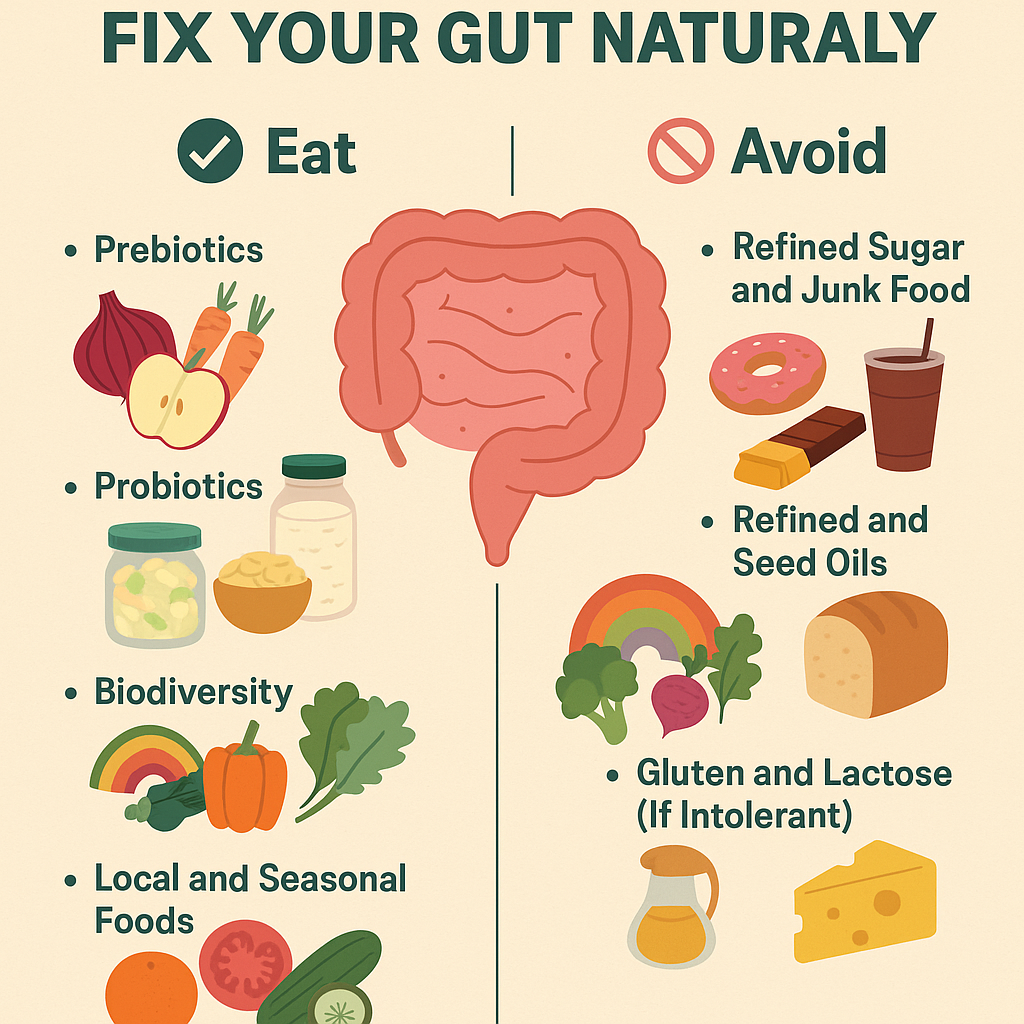Gut health plays a crucial role in our physical and mental well-being. It influences digestion, immunity, metabolism, skin clarity, mental focus, and weight balance. Despite its importance, gut health is often ignored until signs like bloating, constipation, fatigue, or skin issues start appearing.
Fortunately, supporting your gut doesn’t require complicated diets or expensive products. Simple dietary and lifestyle changes can go a long way in restoring the gut microbiome—the community of bacteria that helps regulate multiple bodily functions.
Foods That Support Gut Health
1. Prebiotics
Prebiotics are types of fiber that feed the beneficial bacteria in the gut. Including the following in your daily meals can support gut flora:
Raw onions
Garlic
Apples
Leafy and fibrous vegetables
These foods create a nurturing environment for good bacteria to thrive.
2. Probiotics
Probiotics introduce live beneficial bacteria into the gut. They can be included through:
Homemade curd or yogurt
Fermented vegetables (like carrots or radish soaked in salted water)
Traditional ferments such as sauerkraut or kimchi
Some individuals may experience initial bloating when introducing fermented foods. It’s best to start in small amounts and monitor tolerance.
3. Biodiversity in Food
Eating a variety of fruits and vegetables of different colors ensures that different strains of bacteria are nourished. Each color represents different nutrients and plant compounds, supporting gut diversity and strength.
4. Local and Seasonal Produce
Consuming foods that are grown locally and are in season helps align your body with the natural environment. Regional fruits, vegetables, seeds, and grains are often easier to digest and more effective in supporting gut health.
Foods and Habits That Can Harm Gut Health
1. Refined Sugar and Processed Foods
High intake of sugar feeds harmful bacteria and throws off microbial balance. Processed snacks, desserts, and sugary drinks often contain ingredients like high-fructose corn syrup that are particularly harmful to gut function.
2. Refined Oils and Excess Omega-6
Regular consumption of outside food, fried snacks, and refined seed oils leads to excessive omega-6 intake, which can promote inflammation and negatively affect gut lining.
3. Gluten and Lactose (When Intolerant)
Some individuals are sensitive to gluten or lactose. If unsure, it’s advisable to undergo tests to check for celiac disease or lactose intolerance. Avoiding these foods without medical confirmation may lead to unnecessary restrictions and added stress.
Lifestyle Practices That Support Gut Health
1. Quality Sleep
Sleep plays a major role in regulating gut health. Research shows that even one night of poor sleep can disturb the gut microbiome. Ensuring restful sleep for at least five nights a week helps improve digestion and hormonal balance.
2. Meal Timing and Food Order
The order in which food is consumed during meals also matters. Starting with raw salads, followed by cooked vegetables, proteins, and finally carbohydrates, can improve digestion and regulate blood sugar.
Fiber Intake: Striking the Right Balance
Fiber is important, but balance is key. Too much fiber can cause bloating or discomfort, while too little can lead to constipation. A balanced mix of soluble fiber (such as oats, chia seeds) and insoluble fiber (such as leafy greens and whole grains) should be adjusted based on individual needs and medical conditions.
When Gut Issues Persist
Persistent symptoms like bloating, acidity, irregular bowel movements, or inability to lose weight despite healthy habits may point to deeper issues such as Small Intestine Bacterial Overgrowth (SIBO). In such cases, targeted gut protocols can be more effective than general diet or exercise plans.
Conclusion
Improving gut health is not about drastic changes or expensive routines. It begins with simple, mindful actions:
Eat fresh, local, and seasonal food
Include prebiotics and probiotics if tolerated
Avoid excess sugar and processed food
Maintain regular, quality sleep
Adjust food intake based on observation and feedback from your own body
With consistency and awareness, the gut can repair and restore itself, leading to better energy, clearer skin, stronger immunity, and improved overall health.

